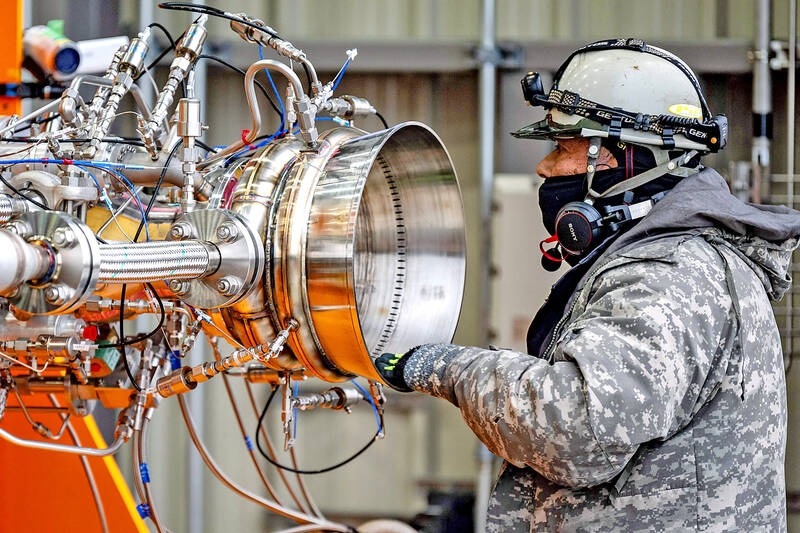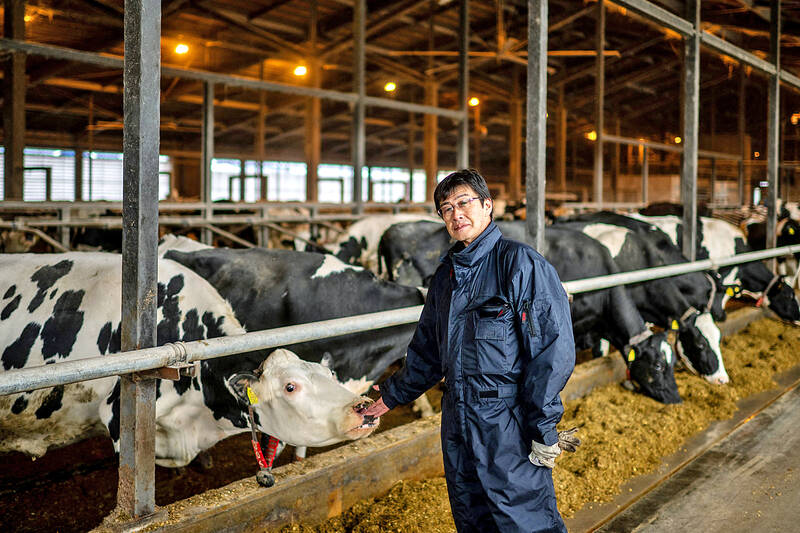Japan’s space industry on Thursday potentially opened an udder-ly new chapter with a start-up testing a prototype rocket engine that runs on fuel derived purely from a plentiful local source: cow dung.
The experiment saw the engine blast out a blue-and-orange flames 10m to 15m horizontally out of an open hangar door for about 10 seconds in the rural northern town of Taiki.
The liquid “biomethane” required was made entirely from gas derived from cow manure from two local dairy farms, Interstellar Technologies Inc CEO Takahiro Inagawa said.

Photo: AFP
“We are doing this not just because it is good for the environment, but because it can be produced locally, it is very cost effective, and it is a fuel with high performance and high purity,” Inagawa said.
“I do not think it is an exaggeration to assume this will be replicated … all over the world,” he said. “We are the first private business to do this.”
Interstellar, which hopes to be able to put satellites in space using the fuel, teamed up with industrial gas producer firm Air Water Inc.

Photo: AFP
It works with local farmers who have equipment on their farms to process their cow dung into biogas which Air Water collects and turns into the rocket fuel.
Resource-poor Japan “must secure domestically produced, carbon-neutral energy now,” Air Water engineer Tomohiro Nishikawa said.
“The raw material from this region’s cows has so much potential. Should something change in international affairs, it’s important that Japan has an energy source that it has already in hand,” he added.
Japan Aerospace Exploration Agency (JAXA) in September launched its “Moon Sniper” mission, but the sector has in the past few years been plagued by problems, with two failed missions — one public and one private.
Japan has also had setbacks with its launch rockets, with mishaps after liftoff of the next-generation H3 in March and the normally reliable solid-fuel Epsilon in October last year.
In July, the test of an Epsilon S rocket, an improved version of the Epsilon, ended in an explosion 50 seconds after ignition.
Biogas derived from cow manure is already being used for fuel around the world, including to run buses in the Indian city of Indore, instead of more polluting conventional sources.
It helps mitigate the enormous environmental footprint of agriculture, which Greenpeace says is responsible for 14 percent of greenhouse gas emissions worldwide.
Burning biogas also releases greenhouse gases, but so does leaving it to degrade naturally, while runoff from farm animals pollutes waterways and soil.
Air Water’s biomethane is already being used by a local dairy and other factories, to heat local homes and to run trucks and ships as pilot programs.
Among participating local farmers is Eiji Mizushita, 58, who raises about 900 milk cows that collectively generate more than 36 tonnes of dung every day.
His farm has an industrial system to automatically collect the waste, ferment it, and turn it into biogas, fertilizer and recycled bedding materials for his animals.
Sales of biogas expands Mizushita’s income by about 1 percent, but he said the effort is worth it.
“I’m excited to think that our cow waste could be used to make it fly,” he said of the rocket.
“We need to properly dispose of and use manure. I also think that the government and society should take a more serious look at the importance of natural renewable energy and encourage its production,” Mizushita said.

SEEKING CLARITY: Washington should not adopt measures that create uncertainties for ‘existing semiconductor investments,’ TSMC said referring to its US$165 billion in the US Taiwan Semiconductor Manufacturing Co (TSMC, 台積電) told the US that any future tariffs on Taiwanese semiconductors could reduce demand for chips and derail its pledge to increase its investment in Arizona. “New import restrictions could jeopardize current US leadership in the competitive technology industry and create uncertainties for many committed semiconductor capital projects in the US, including TSMC Arizona’s significant investment plan in Phoenix,” the chipmaker wrote in a letter to the US Department of Commerce. TSMC issued the warning in response to a solicitation for comments by the department on a possible tariff on semiconductor imports by US President Donald Trump’s

The government has launched a three-pronged strategy to attract local and international talent, aiming to position Taiwan as a new global hub following Nvidia Corp’s announcement that it has chosen Taipei as the site of its Taiwan headquarters. Nvidia cofounder and CEO Jensen Huang (黃仁勳) on Monday last week announced during his keynote speech at the Computex trade show in Taipei that the Nvidia Constellation, the company’s planned Taiwan headquarters, would be located in the Beitou-Shilin Technology Park (北投士林科技園區) in Taipei. Huang’s decision to establish a base in Taiwan is “primarily due to Taiwan’s talent pool and its strength in the semiconductor

An earnings report from semiconductor giant and artificial intelligence (AI) bellwether Nvidia Corp takes center stage for Wall Street this week, as stocks hit a speed bump of worries over US federal deficits driving up Treasury yields. US equities pulled back last week after a torrid rally, as investors turned their attention to tax and spending legislation poised to swell the US government’s US$36 trillion in debt. Long-dated US Treasury yields rose amid the fiscal worries, with the 30-year yield topping 5 percent and hitting its highest level since late 2023. Stocks were dealt another blow on Friday when US President Donald

UNCERTAINTY: Investors remain worried that trade negotiations with Washington could go poorly, given Trump’s inconsistency on tariffs in his second term, experts said The consumer confidence index this month fell for a ninth consecutive month to its lowest level in 13 months, as global trade uncertainties and tariff risks cloud Taiwan’s economic outlook, a survey released yesterday by National Central University found. The biggest decline came from the timing for stock investments, which plunged 11.82 points to 26.82, underscoring bleak investor confidence, it said. “Although the TAIEX reclaimed the 21,000-point mark after the US and China agreed to bury the hatchet for 90 days, investors remain worried that the situation would turn sour later,” said Dachrahn Wu (吳大任), director of the university’s Research Center for